Get on-board with students in projects!
By David McGill & Jenny Hanks
Having students, whether they be undergrad/postgrad/local/international/short-term/long-term, engaged in your R4D project opens up great possibilities for innovation, engagement, stirring up some passion and in many cases, a whole lot of fun!
My first real experience working with students on a project occurred on the back of a random thought bubble I had driving around in Pakistan. I was having trouble collating and synthesising some basic training material and decided that a little bit of help from Australian based students would be a great way to work on multiple modules simultaneously. I took the idea to my boss at the time, Peter Wynn, with the pitch that the students could gain some hands-on experience and coordinate with local students to develop training material. It wasn’t a completely far-out idea, as Peter was (and is) a firm believer in engaging students, particularly in Pakistan. However, the catch was the costs to the project and whether we could convince students to travel to Pakistan or not. Fast-forward a few months and we had four incredible students getting involved, having fun and most importantly working hard with local students.
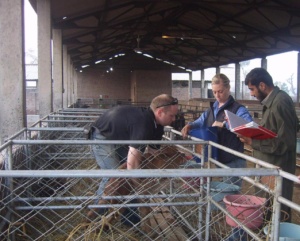 |
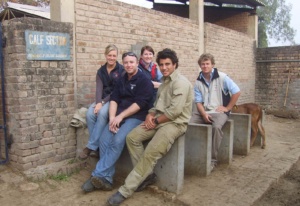 |
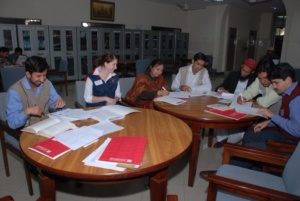 |
Figures:
1.1: David McGill working with students Amanda-Lee Charman (Charles Sturt University) and Faisal (University of Faisalabad) at the calf feeding shed.
1.2: Group shot (from L-R); Amanda-Lee, David, Emma Hand, Shahid Khalfan and Rhys Duncan.
1.3: Emma working with students from all over Pakistan to piece together information for a fodder production module.
The time spent in Pakistan with this first group of students really showed me the power of involving youth. These students spent the first two weeks working on a calf trial and helping set up a protocol of feeding, data recording and maintaining animal health. This was a simple experiment, but having the students there really helped kick it off. Not only did they get straight into it, but they had an incredible ability to break down barriers with local staff, led by example and in many ways livened up the activity with energy and enthusiasm which is infectious to both younger and more experienced local collaborators. They spent the last two weeks, preparing for a student forum and collating research and ideas to help develop their assigned extension material module. The last few days in Pakistan involved running a student forum with students from all over Pakistan, breaking up into four groups, each lead by one of the Australian students and preparing material targeted to help improve smallholder dairy farming systems.
The success of this first trip lead to three more student trips organised throughout the project; in 2010, 2011 and 2012. Each group had their own tasks, projects and dynamic – always making for an interesting few weeks in sunny Lahore. Jenny Hanks, one of the other RAID Committee members, was on one of these Pakistan trips and has had an interesting career develop out of this initial interaction with R4D.
[David exit stage right]
[cue Jenny]
A long time ago (2010) I travelled to Pakistan as a 4th year vet science student with the student trips that David set up. Waking up on the first morning in Lahore to the sound of the call to prayers was a unique way to start off what was my first international trip. There were many memorable moments and some of the best were working with the local students from the University of Veterinary and Animal Science (UVAS). We were three young Australian women paired up with three young Pakistani women. We visited women and children in villages where the project was, carried out surveys and then organised a student forum together. We invited students from all the animal science universities around Pakistan and focussed on key themes for dairy production, as well as research and presentation skills. This gave me a glimpse of life as a student in Pakistan and showed me how much Australian and Pakistani students could learn from each other.
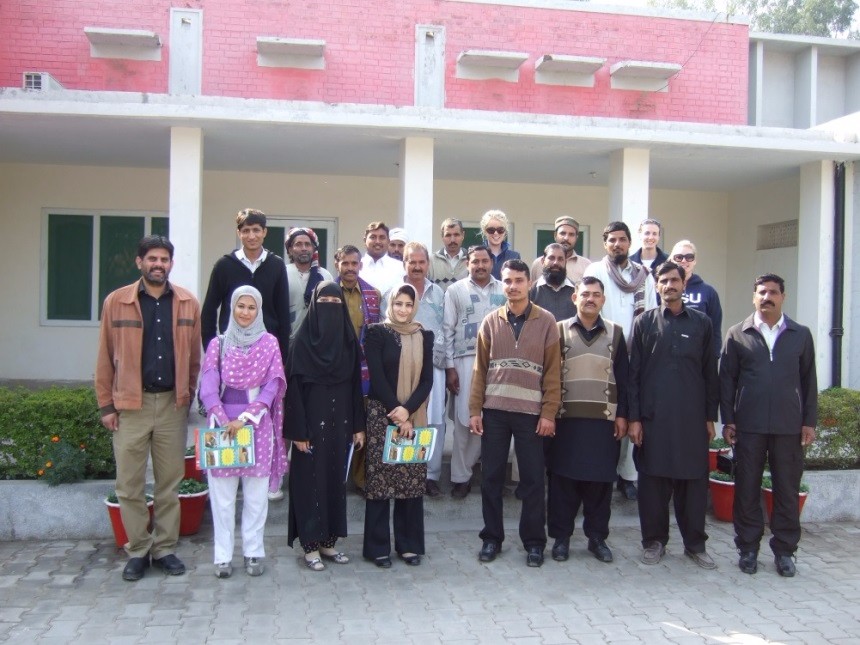
Fig. 2: Three Pakistani women from UVAS and three Australian women from CSU with some of the project team
After a month in Pakistan I returned home to Australia and finished off my vet degree. But I wasn’t content that my experience in Pakistan would become a distant, happy memory while I treated cats and dogs in a vet clinic. Instead I headed to Laos for a couple of months where the University of Sydney have a great program set up with final year veterinary and animal science students spending time working with an ACIAR funded project. While I was there I met Sonevilay Nampanya, who had left Laos to study at Sydney Uni and then returned home to work on the ACIAR project. He had an amazing rapport and understanding with farmers and I could see what an asset he was to the project. He was also working with the Sydney Uni students who came to visit and we worked on a drench trial (deworming of cattle) and some teaching programs whilst I was there. In a similar way to Pakistan I got to see how much you could contribute as a student by working with the local team.
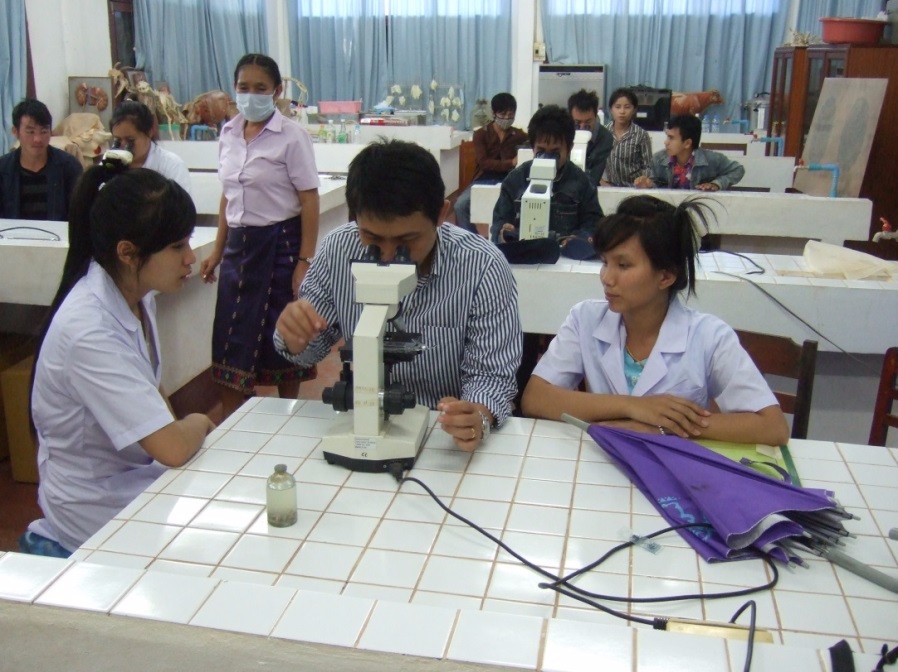
Fig. 3: Sonevilay teaching Laos students how to identify worm eggs under the microscope.
Fast forward a few years, I was keen to involve Australian students on the ACIAR project I work on now in Myanmar. We used a similar model to the Pakistan student trips and had four University of Melbourne final year vet students working alongside four University of Veterinary Science Masters students. This time around I was organising the trip which gave me quite a different perspective. My colleagues, Angus Campbell and Elsa Glanville supervised the students on four research areas and their involvement in project work for two weeks in September last year. This trip undoubtedly generated the most enthusiasm both in Myanmar and in Australia of any trips we’ve had over the past three years. Showing not only was it a great experience for the students but also for the project team.
Some closing thoughts on the benefits of engaging students;
- Allocating specific tasks to students helps to maintain focus and get the most out of the students. For example; data collection for an honours project or a review report which can be drafted and addressed during the trip. This can also help to finish off/kick start project specific task which helps to attain project objectives as well
- Students become an alumni of the project and help to advocate the excellent work R4D is contributing, and promote international/extension opportunities to other students at your University.
- Interaction between groups of students across borders and oceans gives a unique opportunity for individuals studying a similar degree in an entirely different country to connect. This gives perspective to Australian students and local students alike driving new ideas and approaches to their studies and research challenges.
- Students share their experiences with their friends and family which can also change the way they look at the world.
- Most of all students invigorate and energise project team members and make activities more vibrant!


